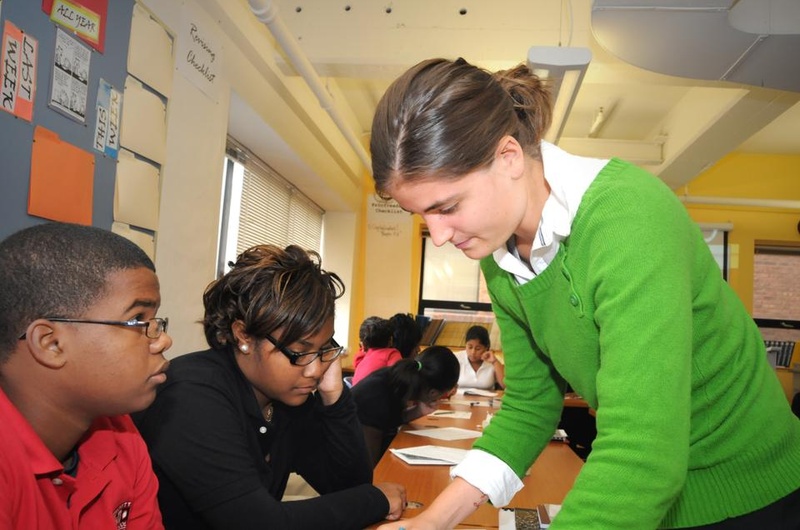
In this courtesy photo, 9th grade humanities teacher Katherine E. Rieser ‘07 works with students at the Community Charter School of Cambridge.
“Citizenship, Commitment, Scholarship and Courage,” reads a motto painted onto a school hallway. The inspirational graffiti is a play on the acronym of the Community Charter School of Cambridge, one of two charter high schools in Cambridge.
Since its founding in 2004, CCSC has aimed to close the racial achievement gap in Cambridge, attracting 80 percent African American and five percent Latino students, most of whom come from economically disadvantaged families.
The school’s teachers, however, come from the opposite end of the spectrum. One-third of the school’s teaching staff graduated from Harvard College or a Harvard graduate program, according to its Chief Communications Officer Justin T. Martin.
As it enters its sixth year, with two graduating classes and alumni at Cornell, Swarthmore, Boston College and at several University of Massaschusetts campuses, the charter school has its share of successes and continues to strive to resolve lingering issues.
MODEL SCHOOL
Located in an atypical school setting—occupying multiple floors of a former office space—CCSC prides itself in its uniqueness, says Paula Evans, Head of School and also one of the school’s founders.
Though only six years old, CCSC has been recognized by Governor Deval L. Patrick ’78 as a 2010 Commendation School, an honor presented to schools that have helped to close the achievement gap.
All CCSC sophomores passed the Massachusetts Comprehensive Assessment System, with 92 percent of students receiving a score of “proficient” or better in language arts and 74 percent receiving similar marks in mathematics and sciences. In comparison, 56 percent of African American students in Cambridge Public Schools performed below average this year according to a CPS report.
Teachers attribute the school’s success to its focus on individualized support for its students through individual attention.
“All of our students get to know the adults and teachers in the building. [Teachers] get to know every student through advising,” says teacher Laura R. Fleming, who received her masters from the Harvard Graduate School of Education.
Math teacher Laura A. Sheppard-Brick, also an HGSE graduate, agrees with the sentiment.
“Teachers have a lot more autonomy and smaller number of students,” she says.
A CHARTER’S CHALLENGES
The school is open to the entire Cambridge community and admits students by lottery, a system that has forced teachers to work with students starting at very different academic levels.
William D. Connell, who is also an HSGE graduate and teaches 10th-grade humanities, thinks that the “managing that kind of span” is the most challenging aspect of teaching at CCSC. There are sometimes students who join CCSC at later grades who are four to five grades behind, he says.
Read more in News
Former Leverett House Master Passes Away












